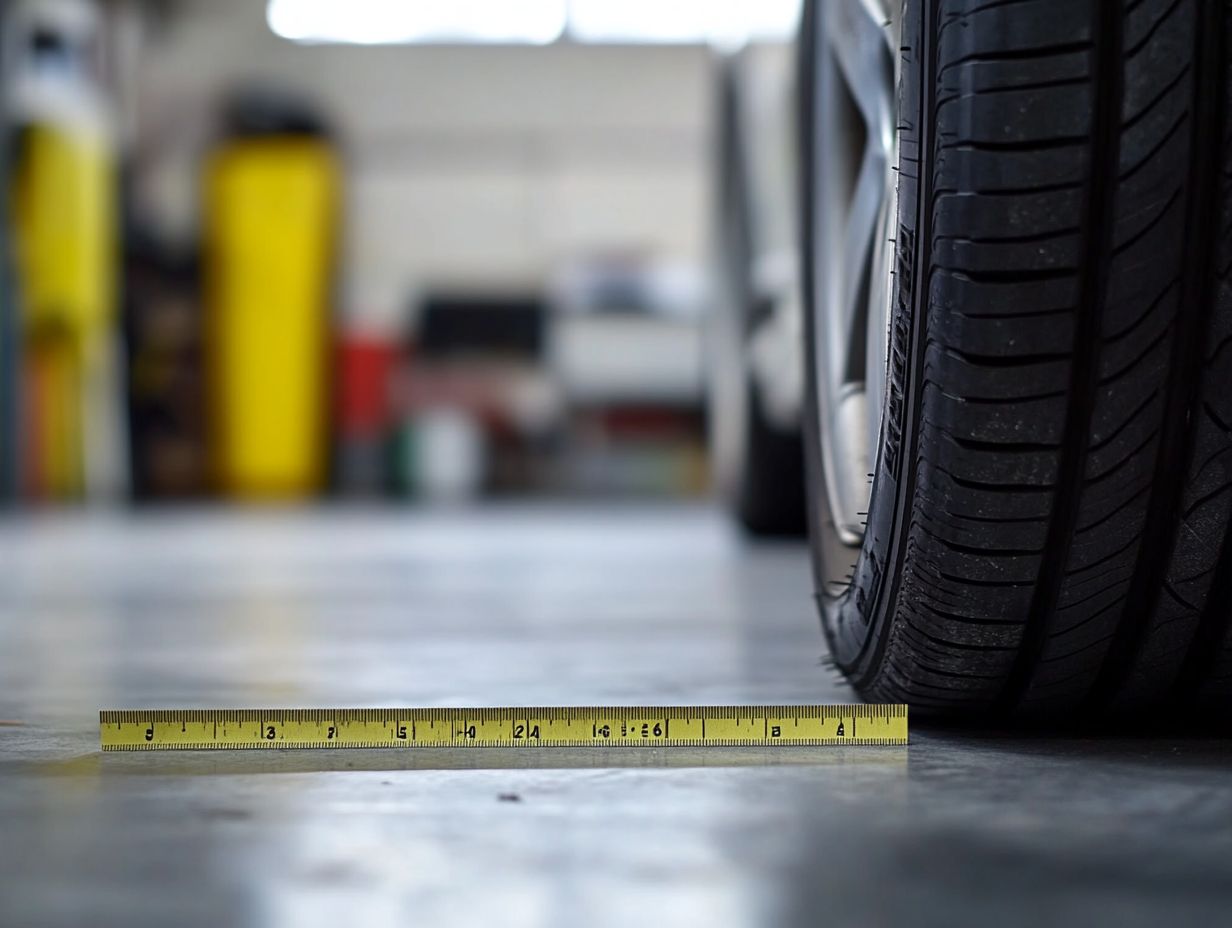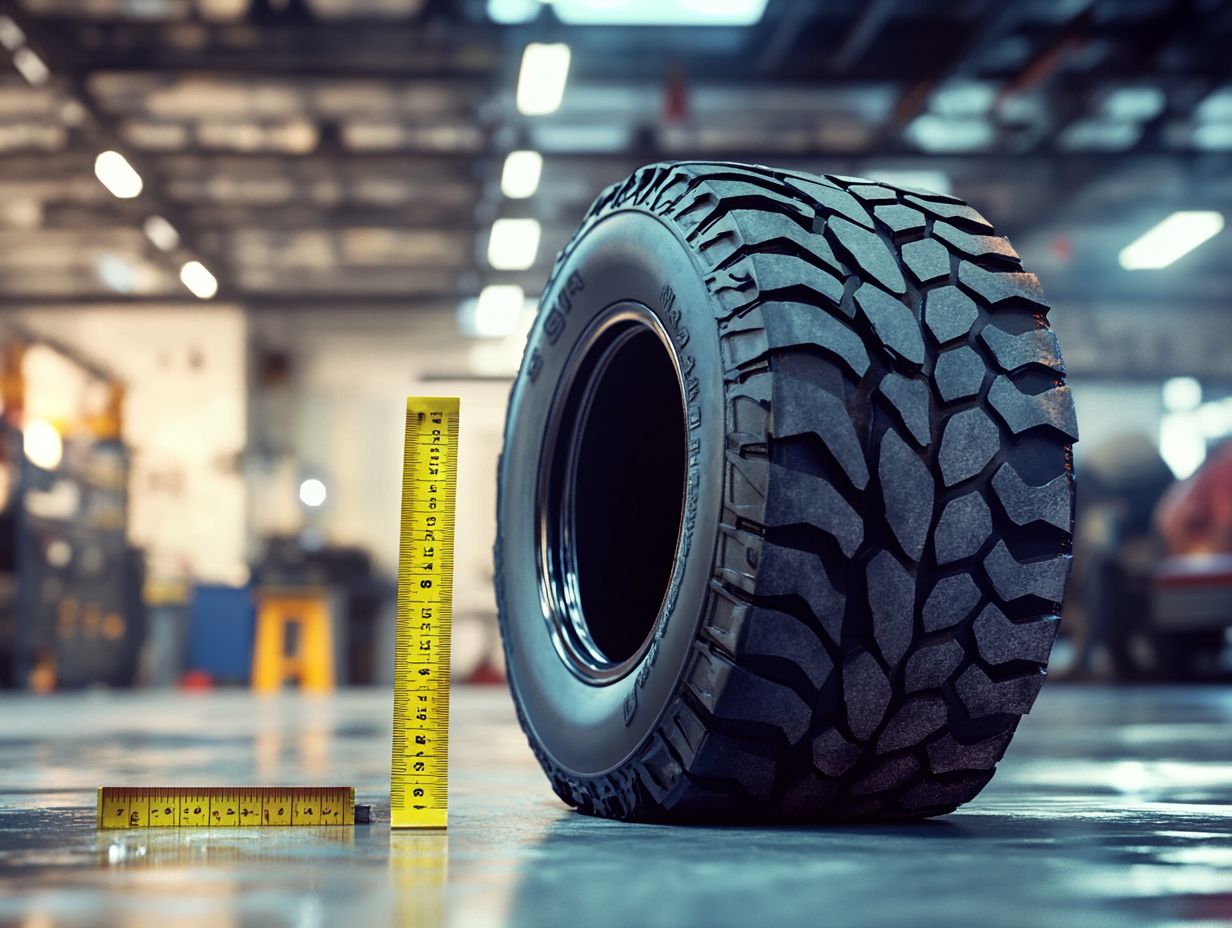How Much Does A Car Tire Weigh?
Regarding car performance, I’ve found that the weight of my tires plays a crucial role, even if it often gets overlooked by many drivers.
Understanding tire weight can really make a difference in my vehicle’s efficiency, handling, and overall safety. This article dives into the factors that influence tire weight, compares different types of tires, and explains why this metric matters.
I’ll even share some tips on how to weigh my tires accurately and some methods to reduce their weight for better fuel efficiency. So let’s dive in and see how tire weight can affect my ride!
Understanding Tire Weight

I find that understanding tire weight is really important for how my vehicle performs, its safety, and even fuel efficiency. The weight of an average car tire can change quite a bit based on things like the tire type, dimensions, and how it’s built.
For example, I’ve noticed that all-season tires usually weigh less than winter tires because of their different rubber compositions and tread depths. When I’m picking tires for my vehicle, I always make sure to consider the weight specifications to ensure proper weight distribution and load capacity that fits with my vehicle’s weight.
Factors that Affect Tire Weight
Regarding tire weight, I’ve realized that a bunch of factors come into play. Things like tire construction, rubber composition, and even the dimensions of the tire all matter. For instance, the type of tire—whether it’s an all-season, winter, or performance tire—can really affect its overall weight. And, of course, the vehicle specs, like size and intended use, determine what tire features are best for optimal performance.
The way tires are built—like the layering and sidewall design—can also have a big impact on both weight and durability. A tire with multiple plies might be heavier, but it gives you added strength and better resistance to punctures.
Then there’s the rubber compounds. Softer compounds can improve grip, but they might add a bit of weight. On the other hand, harder formulations can help reduce weight, although they might sacrifice some traction.
Tire dimensions, like width and aspect ratio, play a role too, influencing rolling resistance and speed—both of which are crucial for performance and safety. Understanding how all these factors are related helps me make smarter choices when picking out tires, which ultimately impacts vehicle handling and road safety.
Average Weight of Car Tires
I’ve noticed that the average weight of car tires can really vary depending on the type, size, and design. Typically, a standard car tire weighs somewhere between 15 to 25 kilograms.
But if we’re talking about specialized tires, like those meant for SUVs or trucks, they can be quite a bit heavier. For example, performance tires often have a unique construction that changes their weight, diameter, and width, which can definitely affect how the vehicle handles and its overall safety.
Comparison of Different Types of Tires
When I’m comparing different types of tires, I know it’s crucial to pay attention to their average weight and dimensions. All-season tires usually weigh less than winter tires because of their different rubber composition and design. On the flip side, performance tires can be just as heavy or even heavier because they come packed with features that boost grip and traction, impacting my driving experience.
This variation in weight and size doesn’t just play a role in fuel efficiency; it also affects how my vehicle handles different driving conditions. All-season tires are perfect for moderate climates, as they provide a balanced ride. Winter tires, on the other hand, are built for extreme weather, giving me superior traction on icy roads.
Then there are performance tires, designed for high speeds and sharp cornering. They can definitely give me a sportier feel, but I might find myself sacrificing some comfort in my everyday driving. Understanding these specs helps me make informed choices that prioritize safety ratings and my vehicle’s overall performance, ensuring I pick the right tires for my specific needs.
Why Tire Weight Matters

Tire weight might seem like a small detail, but it actually has a huge impact on tire performance, vehicle handling, and even safety ratings.
I’ve noticed that heavier tires can increase rolling resistance, which can really hurt fuel efficiency and affect how fast and agile my vehicle feels.
It’s important to understand how tire weight relates to environmental impact so I can make smart choices about tire usage and when to replace them.
Impact on Vehicle Performance and Safety
I can’t stress enough how much tire weight impacts vehicle performance and safety. Heavier tires can really mess with handling, especially when I’m cornering or braking, while lighter tires tend to make my vehicle feel more responsive. The weight of the tires also affects load capacity, which plays a big role in my vehicle’s safety rating and overall performance in different driving situations.
Understanding this whole dynamic is super important for anyone who wants their vehicle to run at its best. Keeping my tires properly inflated is key because under-inflated tires can really amplify the downsides of heavy tires, leading to longer stopping distances and less precise cornering.
Regular maintenance, like tire rotations and inspections, can help me tackle these issues. By prioritizing these practices, I can boost my vehicle’s performance and enjoy a safer driving experience, especially when I’m dealing with tough road conditions.
How to Weigh Car Tires
Weighing my car tires accurately is super important for getting a handle on their weight variations and making sure they perform at their best. I can do this in a few different ways, like using a digital scale when I’m mounting the tires or even just doing a visual inspection to get a rough idea of their weight.
I’ve also found it helpful to keep a tire tracking system to monitor any changes in tire weight over time. It really adds to my maintenance routine and boosts safety, too.
Methods and Tools for Accurate Measurement
I’ve found there are several methods and tools for accurately measuring tire weight. From digital scales to tire mounting equipment, and even some good old-fashioned visual inspection techniques, each has its own perks. Personally, I think combining these approaches gives the most accurate results—especially when I use a tire tracking system to keep an eye on weight fluctuations over time.
Digital scales are awesome because they’re precise and super easy to use, letting me get quick measurements. Tire mounting equipment can also be helpful, giving me insights into how weight distribution impacts handling.
On the downside, though, some of these methods might need calibration and can be a bit pricey. Meanwhile, basic visual inspections are free and super accessible, but they just don’t have the precision I need for serious tire maintenance.
By knowing the pros and cons of each tool, I can make smarter choices that improve the accuracy of my tire weight measurements, which is crucial for keeping my vehicle performing at its best and ensuring safety on the road.
Reducing Tire Weight

I’ve found that reducing tire weight can really boost fuel efficiency and enhance handling, which is why it’s such an important factor in tire design. Thanks to innovations in tire construction and rubber composition, manufacturers can now create lighter yet durable tires that don’t sacrifice safety or performance.
When I choose the right tire features, I can make a noticeable difference in the environmental impact of tire usage.
Tips for Improving Fuel Efficiency and Handling
Improving fuel efficiency and handling through tire weight management starts with making sure my tires are properly inflated and getting regular maintenance. Keeping my tires adequately inflated not only boosts performance but also extends their lifespan and helps me drive safely. Plus, picking up some smart driving habits can really maximize efficiency and handling, letting me get the most out of my tires.
To get the best results, I make it a point to check my tire pressure regularly—ideally every month or before any long trips. I adjust it to the manufacturer’s recommended levels, which I can usually find in the vehicle’s manual or on a handy sticker inside the driver’s door.
I also do a quick visual inspection for any uneven wear or foreign objects that could cause trouble down the line. Enhancing my driving techniques, like maintaining a steady speed and avoiding sudden accelerations, can really help with fuel economy.
By weaving these practical tips into my routine vehicle care, I can definitely achieve better performance and efficiency.
Final Thoughts and Considerations
Understanding tire weight and how it affects my vehicle’s performance, handling, and safety is super important for tire maintenance. When I choose the right tire features and stick to proper maintenance practices, I can really boost my vehicle’s performance and enjoy a safer driving experience. I always make it a point to keep an eye on tire pressure, tread depth, and wear indicators to ensure my tires are in tip-top shape.
Tire weight has a big impact on how well my vehicle accelerates, brakes, and handles different road conditions. When I take the time to pick tires that suit my specific model and driving style, I not only enhance responsiveness but also help improve overall fuel efficiency.
Being aware of these factors helps me drive better and promotes safety on the road, which ultimately reduces the risk of accidents. I also make sure to do regular inspections and pay attention to tire age and seasonal changes. This proactive approach to tire care gives me peace of mind and helps extend the life of my tires.
It’s not just about performance; these measures are key to keeping myself and other road users safe.
Frequently Asked Questions
How much does a car tire weigh in general?

The average weight of a car tire is around 20 pounds (9 kg). This applies to most standard-sized tires for passenger cars and small SUVs.
How does the weight of a car tire affect its performance?
The weight of a car tire can affect its performance in terms of handling, fuel efficiency, and durability. Heavier tires may provide better traction, but can also decrease fuel efficiency and increase wear and tear on the vehicle.
How much does a spare tire weigh compared to a regular car tire?
A spare tire typically weighs less than a regular car tire, averaging around 15 pounds (7 kg). This is because spare tires are designed to be temporary and are usually smaller in size.
Do different types of tires have different weights?
Yes, different types of tires have different weights depending on their size, design, and intended use. For example, performance or racing tires may weigh more due to their specialized construction and materials.
Can the weight of a car tire impact its price?
Yes, the weight of a car tire can impact its price. Generally, heavier tires tend to be more expensive due to the materials and technology used in their construction. However, factors such as brand and size also play a role in determining the price.
How much does a car tire weigh when it is brand new?
The weight of a brand new car tire can vary depending on the size and type of tire. On average, a new car tire can weigh anywhere from 20 to 25 pounds (9 to 11 kg). It is important to check the manufacturer’s specifications for the exact weight of a specific tire model.
